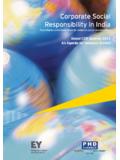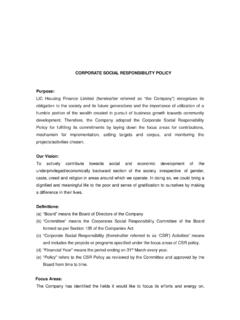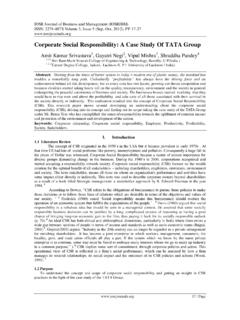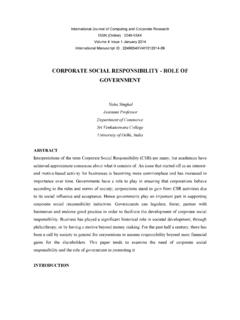Transcription of Corporate Social Responsibility in India - An Effort …
1 WP-2015-023. Corporate Social Responsibility in India - An Effort to Bridge the Welfare Gap Jayati Sarkar and Subrata Sarkar Indira Gandhi Institute of Development Research, Mumbai August 2015. Corporate Social Responsibility in India - An Effort to Bridge the Welfare Gap Jayati Sarkar and Subrata Sarkar Indira Gandhi Institute of Development Research (IGIDR). General Arun Kumar Vaidya Marg Goregaon (E), Mumbai- 400065, India . Email(corresponding author): Abstract Drawing on existing theoretical and empirical literature on the rationale behind Corporate Social Responsibility (CSR), this paper analyses the potential implications of mandated CSR under the recently enacted Companies Act, 2013 in India on firm incentives, likely responses of corporates that come under the ambit of the law, implications for resource availability and delivery of Social goods, and the prospects and challenges of implementing mandated CSR.
2 Insights into these issues are drawn by empirically examining the voluntary CSR behavior of a sample of 500 large companies listed on the Bombay Stock Exchange for the period 2003-2011 that predates the new regulation. The paper argues that notwithstanding the potential economic costs that may accompany mandated CSR, the provisions of the new Act are designed thoughtfully to balance the objectives of the corporation and its shareholders on the one hand and that of the society and its stakeholders on the other. However, addressing the challenges of implementation successfully would determine how far the objectives of the new regulations are met.
3 Keywords: Corporate Social Responsibility , firm incentives, Social welfare, efficiency, regulation, enforecment JEL Code: G38, H21, H53 L21. Acknowledgements: Forthcoming in Review of Market Integration, 2015, Sage Publishers. We thank the workshop participants at the Indira Gandhi Institute of Development Research for their comments and suggestions. We thank Ritika Jain for providing excellent research assistance. The usual disclaimer applies. A longer version of this work was written by the authors as a chapter in the India Development Report. Introduction Indian corporations, like those in other countries, have had a long tradition of being engaged in Social activities that have gone beyond meeting a corporation's immediate financial objectives.
4 However, since the late nineties, CSR activities have increasingly come under the lens both of policy makers as well as of corporations' stakeholders as governance issues acquired increasing prominence. At the policy level, the formal focus on CSR started in India with the issuance of the Corporate Social Responsibility Voluntary Guidelines in 2009 by the Ministry of Corporate Affairs (MCA, 2009) that culminated in the enactment of Section 135 of the Companies Act 2013 (MCA, 2013) making CSR spending as well as CSR disclosure mandatory for specific types of companies. Significantly while CSR issues have been gaining in prominence across countries, India became the first country, and at the time this article is written, the only country to have made CSR activity mandatory for large and profitable companies incorporated into law.
5 In all other countries CSR efforts by corporations have been kept largely voluntary, with only a select number of countries mandating corporations to disclose such activities. Not surprisingly, therefore, Section 135 in India has generated largely polarized opinions among policy makers, corporates, industry associations, Social sector organizations, and last but not the least, academicians. On one hand, the institution of mandatory CSR has been lauded in policy circles as a historical opportunity that could be a game changer for India where corporates would work hand in hand with the government and civil society to bring about national regeneration through sustainable development.
6 Unorthodox as it may seem, some have argued that for a developing country like India , mandatory CSR may be an instrument to pursue a middle path between a liberal and a regulatory state so as to balance growth with Social stability. On the other hand, critics of mandatory CSR, primarily corporates and business associations have pointed out that making CSR activities mandatory is essentially an exercise in outsourcing government Social Responsibility to the private sector and making the latter pay for the failures of the former. Further, when such activities are not clearly defined, mandatory CSR. will create perverse incentives for corporates to camouflage activities to meet mandatory requirements or find ways to bypass the law.
7 Given the conflicting viewpoints around mandatory CSR, the objective of this paper is to examine in light of Section 135 and the Rules notified thereunder (MCA, 2014a), the 1. fundamental and overarching question of whether mandated CSR would have the potential to bridge the welfare gap in a developing country like India . Specifically, the paper analyses the potential implications of Section 135 on firm incentives, the likely responses of corporates that come under this Section, its implications for resource availability and delivery of Social goods, and finally the prospects and challenges of implementation of mandated CSR spending under the notified Rules.
8 Insights into these issues are drawn by empirically examining the CSR behavior of a sample of 500 large companies listed on the Bombay Stock Exchange for the period 2003- 2011. The paper is organized as follows. Section 2 sets the stage for discussing the relevant issues outlined in the introduction by presenting the key provisions of mandatory CSR under Section 135 of the Companies Act, 2013. Section 3 provides an overview of the existing theoretical and empirical literature regarding the rationale behind CSR while Section 4 discusses the various regulatory approaches and identifies the potential costs and benefits of mandated CSR.
9 To put the issue of mandatory CSR in perspective, Section 5 empirically analyses the voluntary CSR. initiatives by the top 500 listed companies in India for the period 2003-2011, a period prior to the enactment of Section 135. Section 6 concludes the paper by examining the prospects and challenges of implementing mandatory CSR in India . 2. CSR in India The Legal Framework The first formal attempt by the Government of India to put the CSR issue on the table was in the issuance of Corporate Social Responsibility Voluntary Guidelines in 2009 by the Ministry of Corporate Affairs (MCA, 2009). Prior to this, the importance of CSR was discussed in the context of Corporate governance reforms, such as in the Report of the Task Force on Corporate Excellence by the Ministry of Corporate Affairs (MCA, 2000).
10 While the report made a business case for CSR as well as highlighted the Social benefits stemming from it, the discussion was recommendatory in nature and there were little actionable points. It is in the Voluntary Guidelines of 2009 that the core elements of a CSR policy was spelt out that included care for all stakeholders, ethical functioning, respect for workers' rights and welfare, respect for human rights, respect for the environment and activities to promote Social and inclusive development. The Guidelines specifically drew a distinction between philanthropy and CSR activities, and highlighted the voluntary nature of CSR activities that go beyond any statutory or legal 2.















